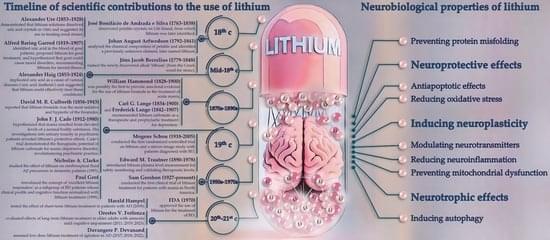Lithium was introduced into psychiatric practice in the late nineteenth century and has since become a standard treatment for severe psychiatric disorders, particularly those characterized by psychotic agitation. It remains the most effective agent for managing acute mania and preventing relapses in bipolar disorder. Despite potential adverse effects, lithium’s use should be carefully considered relative to other treatment options, as these alternatives may present distinct safety and tolerability profiles. The World Health Organization classifies lithium salts as ‘essential’ medications for inclusion in global healthcare systems. Over the past two decades, the growing recognition of lithium’s efficacy—extending beyond mood stabilization to include reducing suicide risk and inducing neuroprotection—has led to its incorporation into clinical practice guidelines.
